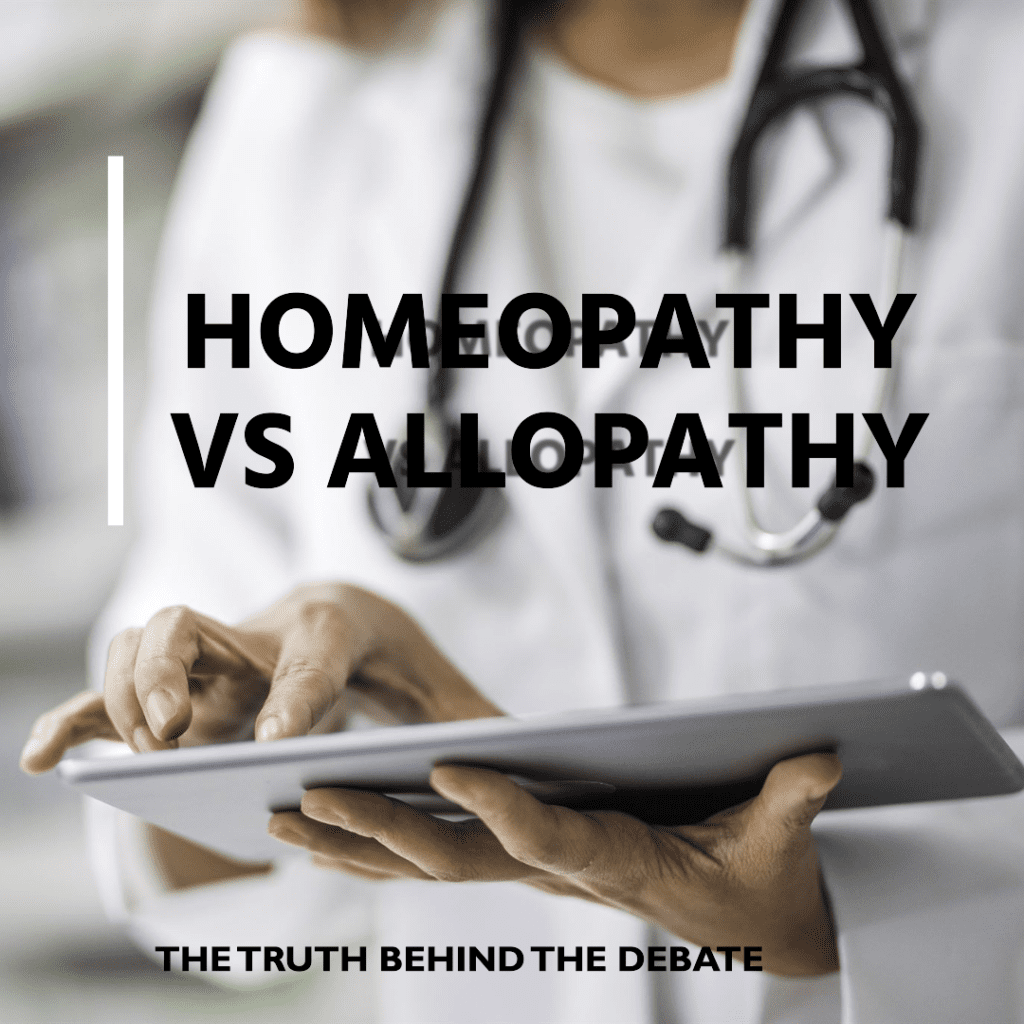Discover the truth behind the age-old debate: Is Homeopathy Better Than Allopathy? The question is incomplete in itself. Both systems are good and stand for the best when they are required. Only Allopathy is the best where Allopathy is needed and so only Homoeopathy is the best where Homoeopathy is required.
Both systems are gifted to mankind and both are essential according to their needs. There is nothing like this is mine and that is yours, so mine is fine and yours is bad. Both are ours and it depends on the needs.
So, let's uncover the differences, benefits, limitations and requirements of both healthcare approaches to make an informed decision according to your need for your well-being. Also, when is Allopathy better than Homeopathy and when is Homeopathy better than Allopathy?
Table of Contents

Introduction: Is Homeopathy Better Than Allopathy?
In the realm of healthcare, individuals often seek clarity on the most effective treatment options available. Among the numerous approaches, two methodologies stand out prominently: homeopathy and allopathy. Both have distinct philosophies and methodologies, sparking a perpetual debate on their effectiveness and superiority. In this comprehensive analysis, we delve into the nuances of homeopathy and allopathy, exploring their principles, and efficacy to shed light on the question: Is homeopathy better than allopathy or is allopathy better than homeopathy?
Understanding Homeopathy: Is Homeopathy Better Than Allopathy?
Homeopathy, founded by Samuel Hahnemann in the late 18th century, operates on the principle of "like cures like" and the "concept of dilution"Doctrine of Drug Dynamization". This system believes that a substance causing symptoms in a healthy person can treat similar symptoms in a sick person when highly diluted (dynamized). Homeopathic remedies are prepared through a process of serial dilution and succussion, resulting in extremely diluted (dynamized/potentised) solutions.
Advocates of homeopathy highlight its holistic approach, focusing on individualized treatment and stimulating the body's self-healing mechanisms. They argue that homeopathic remedies, although highly diluted, retain an energetic imprint that can trigger healing responses.
However, critics of homeopathy point to its lack of scientific plausibility and empirical evidence. Skeptics argue that any perceived benefits from homeopathic treatments can be attributed to a placebo effect rather than the remedies themselves.
Exploring Allopathy: Is Homeopathy Better Than Allopathy?
Allopathy, also known as conventional or Western medicine, typically involve the use of pharmaceutical drugs, and other interventions aimed at targeting specific symptoms or underlying causes of diseases.
Critics of allopathy often cite concerns regarding overreliance on pharmaceuticals, potential side effects, and the tendency to focus on symptom management rather than addressing root causes. Additionally, the high costs associated with certain allopathic treatments raise accessibility issues, particularly in underserved communities.
Comparative Analysis: Is Homeopathy Better Than Allopathy?
When comparing homeopathy and allopathy, several key factors come into play:
- The word "Allopahty" was first introduced by Master Hahnemann, the founder of Homeopathy. His intention was not to bifurcate two systems, but he tried to teach us about the use of medicinal substances. If a medicine can produce symptoms similar to the symptoms of the patient is then it is homeopathic and if it is dissimilar then it is allopathic.
- The similar and stronger (dynamized/potentised) is curative and the dissimilar is palliative. So no medicine is homeopathic or allopathic, it's use may be homeopathic or palliative.
- If a patient is so weak that his/her vital force can't react against the dynamic potency and a cure is not possible, then only palliative management through a dissimilar drug is possible instead of curative treatment with the help of a similar and stronger remedy. If cure is possible then why palliate?
- Today's modern medicine is not fully allopathic. Most of the patented mixtures sold in the name of homeopathy are not homeopathic, because there is no medicine in homeopathy for a disease. Still, there is a medicine for a patient and mixing two or more dynamic potencies assuming it may provide relief for a disease is only speculation without any philosophical or scientific base.
- Individualized vs. Standardized Treatment: Homeopathy emphasizes individualized treatment plans tailored to each patient's unique symptoms and constitution. Allopathy, on the other hand, often employs standardized protocols and guidelines for diagnosis and treatment, although personalized medicine approaches are gaining traction within the allopathic community.
- Safety and Side Effects: so-called modern medications undergo testing diseased animals or human beings so the effect of the drug is not clear because disease symptoms are mixed with drug symptoms. Also the effect of the drug is only observed for the particular ailment, not for the whole organism. So many of the drugs get banned after a few years. So side effects can occur with allopathic treatments
- Homeopathic remedies are generally considered safe due to their high dilution levels. Homoeopathic medicines are proven (tested) on healthy individuals, so we know the actual effects of every medicine. We know what they can produce, so we know what they cure.
- Accessibility and Affordability: Allopathic healthcare services, including consultations, diagnostics, and treatments, can be expensive, particularly in privatized healthcare systems. Homeopathy may offer a more affordable alternative for some individuals, but it doesn't mean that cheaper is not better.
- Last but not least, homoeopathy is not slow, however, a permanent solution will always take more time than temporary management and homeopathy doesn't act late, people come late to homeopathy.
Conclusion: Is Homeopathy Better Than Allopathy?
In the ongoing debate between homeopathy and allopathy, the definitive answer emerges regarding which approach is actually needed to the patient. Both systems have their strengths and limitations, and the choice between them ultimately depends on individual requirement.
If a cure is possible through curative treatment with the help of a medicine chosen on similar symptoms (homeopathic) then palliative management with dissimilar drug must not be allowed and if due to extreme weakness of the patient cure is not possible, then the palliative management with the help of dissimilar drug is the only option.
While allopathy remains the dominant paradigm in mainstream healthcare, homeopathy continues to attract followers who value its holistic principles and patient-centred approach.
As advocates and skeptics engage in the discourse surrounding these divergent healthcare philosophies, the overarching goal remains unchanged: to provide safe, effective, and accessible healthcare options that promote healing and improve the quality of life for all individuals, regardless of their chosen path to wellness.
Disclaimer: The purpose of the information given here is to provide education only, not to provide treatment and should not be considered a substitute for professional medical advice. Always consult with a qualified homeopathic practitioner before beginning any treatment regimen. We do not aim to criticize any medical system, because anything in this world is right or wrong depending on the use according to "place, period and person".


